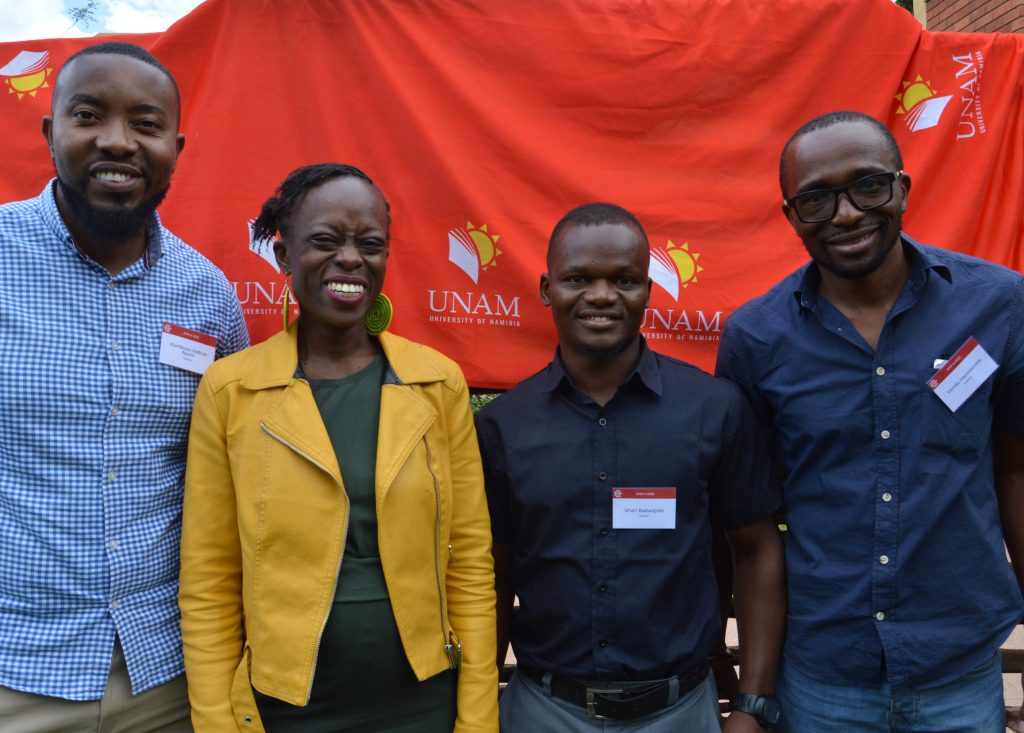A new era of self-reliance for African energy policy creators as students become teachers for the first time with CCG.
The recent Energy Modelling training programme in Namibia, marked a milestone in the work of CCG and its Energy Modelling Summer Schools. The programme, which was hosted by the University of Namibia, saw professionals from Zambia, Nigeria and Kenya take on the role of trainers, with online support from colleagues from Mauritius, South Africa and the Democratic Republic of Congo.
Shari Babajide, Yanda Hamilemba, Michelle Akute Liza and Kumbuso Joshua Nyoni (pictured) trained participants from across Africa in the OSeMOSYS energy modelling tool. OSeMOSYS is an open-source modelling system which can be used to develop energy systems models from a global level to the level of an individual village. It is one of nine options offered by the CCG training programme.

Mark Howells, Director of CCG, commented: “It is a key part of our ethos that the countries with whom we work are empowered to make their own decisions on future energy policy and economic growth. So, it is really heartening to see professionals from African countries using the training we have provided to train their fellow countrymen and women in a way that is self-sustainable.”
Kumbuso Joshua Nyoni commented: “I am thrilled to have been a part of this milestone, where my colleagues and I have become the first students to become trainers for the programme. It is a great honour and a testament to the effectiveness of the programme.
The programme not only empowers us to make informed decisions about our energy policy, but it also equips us with the skills to train others and promote sustainability in our communities. By becoming trainers ourselves, we are able to pass on this knowledge and continue building capacity at the local level, which is crucial for the sustainability of the programme.”
Yanda Hamilemba added: “Experiencing this ‘Summer School’ both as a trainee and trainer has been an awesome and inspiring experience. Being a trainer exposed me to the diverse and unique nature of power sector challenges and policies currently subsisting in the different countries which participated in the track. The contrasts in the landscape are vast; for example, Ethiopia has a power supply mix which is almost 100% hydroelectric, while The Gambia is entirely dependent on thermal power plants. This experience has motivated me to learn more about the policies and power situation in sub-Saharan Africa beyond my own country of Zambia.
Platforms like the EMP-A, in my opinion, can significantly contribute to the institutionalization of data-driven policy formulation and its implementation in sub-Saharan Africa by expanding the pool of energy modelling experts.”
Shari Babajide attended two training programmes before becoming a trainer: “Being a first-time trainer at the EMP-A 2023 was a big deal for me, particularly in sharing my knowledge and expertise in energy modelling. I was able to understand the diversity in several African countries’ energy systems, national agendas and plans to achieve Net-zero and their Nationally Determined Contributions.
I had the first-hand opportunity to connect with energy modellers across Africa and I was thrilled at the participants’ ability to come up with informative energy policy briefs and excellent presentations that could shape energy transitions in the region.” Michelle Akute Liza concluded: “This training has enabled me to learn and grow in ways I did not imagine. The impact of being a part of this programme has been holistic as I have not only gained in terms of technical know-how but also in social and moral aspects. I continue to learn and grow through it and I would particularly like to thank CCG Researcher Carla Cannone who trained us and continues to support us.”